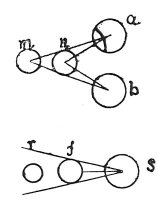
The Da Vinci Notebooks at sacred-texts.com
Painters often fall into despair of imitating nature when they see their pictures fail in that relief and vividness which objects have that are seen in a mirror; while they allege that they have colours which for brightness or depth far exceed the strength of light and shade in the reflections in the mirror, thus displaying their own ignorance rather than the real cause, because they do not know it. It is impossible that painted objects should appear in such relief as to resemble those reflected in the mirror, although both are seen on a flat surface, unless they are seen
with only one eye; and the reason is that two eyes see one object behind another as a and b see m and n. m cannot exactly occupy [the space of] n because the base of the visual lines is so broad that the second body is seen beyond the first. But if you close one eye, as at s the body f will conceal r, because the line of sight proceeds from a single point and makes its base in the first body, whence the second, of the same size, can never be seen.
268:255 : This passage contains the solution of the problem proposed in No. 29, lines 10-14. Leonardo was evidently familiar with the law of optics on which the construction of the stereoscope depends. Compare E. VON BRUCKE, Bruchstucke aus der Theorie der bildenden Kunste, pg. 69: "Schon Leonardo da Vinci wusste, dass ein noch so gut gemaltes Bild nie den vollen Eindruck der Korperlichkeit geben kann, wie ihn die Natur selbst giebt. Er erklart dies auch in Kap. LIII und Kap. CCCXLI (ed. DU FRESNE) des 'Trattato' in sachgemasser Weise aus dem Sehen mit beiden Augen."
Chap. 53 of DU FRESNE'S edition corresponds to No. 534 of this work.